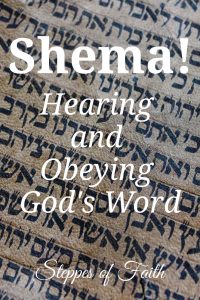
“You shall love the Lord your God with all your heart, with all your soul, and with all your strength.” Deuteronomy 6:5
In the book of Deuteronomy, God gives Moses His greatest commandment.
“You shall love the Lord your God with all your heart, with all your soul, and with all your strength.”
Jesus repeats this commandment in Matthew 22:36, but He adds a bit more.
“’You shall love the Lord your God with all your heart, with all your soul, and with all your mind.’ This is the first and great commandment. And the second is like it: ‘You shall love your neighbor as yourself.’ On these two commandments hang all the Law and the Prophets.”
Because Jesus repeats it, we know the Great Commandment must be very important. But, unless you are Jewish, you probably do not know what came immediately before God first gave Moses this commandment.
It is called Shema.
What is Shema?
The Shema (pronounced “shmah”) is considered the most essential declaration of faith in all of Judaism. Reciting it daily with your eyes covered is even considered by devout Jews to be a biblical commandment.
The Shema is central to daily morning and evening prayers, but it’s also spoken at the conclusion of Yom Kippur, the Jewish New Year, during Shabbat (Sabbath) services, and when one is close to death. Many parents recite the Shema during bedtime prayers with their children.

Jewish women covering their eyes as they pray the Shema.
The Great Commandment
The Shema immediately precedes when God gives His Great Commandment to the entire nation of Israel in Deuteronomy 6:5.
“Hear, O Israel: The Lord our God, the Lord is one!” (Deuteronomy 6:4)
In Hebrew it is “She-ma yisrael, adonai eloheinu, adonai echad.”
Reading from right to left in Hebrew, this first line looks like this:
שְׁמַע יִשְׂרָאֵל יְהוָה אֱלֹהֵינוּ יְהוָה אֶחָֽד
The Jewish faithful then repeat something that is not in the Torah or in the Christian Bible: “Blessed is the name of His glorious kingdom forever and ever.” In Hebrew it is “She-ma yisrael, adonai eloheinu, adonai echad.” Written it is…
בָּרוּךְ שֵׁם כְּבוֹד מַלְכוּתוֹ לְעוֹלָם וָעֶד
The rest of Shema picks up again with Deuteronomy 6:5-9.
“You shall love the LORD your God with all your heart, with all your soul, and with all your strength. And these words which I command you today shall be in your heart. You shall teach them diligently to your children and shall talk of them when you sit in our house, when you walk by the way, when you lie down, and when you rise up. You shall bind them as a sign on your hand, and they shall be as frontlets between your eyes. You shall write them on the doorposts of your house and on your gates.”
In Judaism, these six verses are repeated twice daily in fulfillment of rabbinical command. In Hebrew, they look like this:
וְאָ֣הַבְתָּ֔ אֵ֖ת יְהוָ֣ה אֱלֹהֶ֑יךָ בְּכָל־לְבָבְךָ֥ וּבְכָל־נַפְשְׁךָ֖ וּבְכָל־מְאֹדֶֽך
וְהָי֞וּ הַדְּבָרִ֣ים הָאֵ֗לֶּה אֲשֶׁ֨ר אָנֹכִ֧י מְצַוְּךָ֛ הַיּ֖וֹם עַל־לְבָבֶֽךָ
וְשִׁנַּנְתָּ֣ם לְבָנֶ֔יךָ וְדִבַּרְתָּ֖ בָּ֑ם בְּשִׁבְתְּךָ֤ בְּבֵיתֶ֙ךָ֙ וּבְלֶכְתְּךָ֣ בַדֶּ֔רֶךְ וּֽבְשָׁכְבְּךָ֖ וּבְקוּמֶֽךָ
וּקְשַׁרְתָּ֥ם לְא֖וֹת עַל־יָדֶ֑ךָ וְהָי֥וּ לְטֹטָפֹ֖ת בֵּ֥ין עֵינֶֽיךָ
וּכְתַבְתָּ֛ם עַל־מְזוּזֹ֥ת בֵּיתֶ֖ךָ וּבִשְׁעָרֶֽיךָ
Following this first part, there are two more “blessings” to pray- “Revelation” and “God Alone is the Eternal Redeemer.” Though a bit lengthy, all three parts create a beautiful prayer.
But to get to the true heart of Shema, we will only focus on Blessing One.

Blessing One: Hearing
“Hear, O Israel.” (Deuteronomy 6:4)
Blessing One in Deuteronomy 6 begins with God using the Hebrew word for “hear.” Some translations use “listen.” But “hear” has a deeper meaning than what we have in the English language.
Most of us likely think God is using “hear” as a dictionary defines it: “to perceive by the ear.” But in Hebrew, Shema means intently listening, paying attention, understanding and comprehending, obeying, and responding with action.
Later in the New Testament, the Bible tells us Jesus often said, “Whoever has ears to hear, let them hear ( e.g., Mark 4:9).” What He really meant was, “If you have ears that work and have heard Me, respond by obeying.” In this way, we are to be doers of the Word and not just listeners (James 1:22).
Following the command to hear (shema), God reminds us of who He is.
“The LORD our God, the LORD is one!” (v4)
The Hebrew word for “one” is “echad.” It can also mean alone, single, unique, or unified. But the Torah says, “The LORD is our God, the LORD alone.” Why is that a big deal?
Replacing “one” with “alone” changes the entire meaning of the verse. Now, instead of simply proclaiming there is only one, singular God, He is telling us He alone is God and there is no other. He alone is the one we should worship and serve.
Shema is Love
Next, God tells the Israelites to “love the LORD your God with all your heart, with all your soul, and with all your strength.” In Hebrew culture, love is not simply an emotion. It denotes an action or a response. In this case, love means faithfulness and commitment.
Remember Shema means listening and obeying. Put Shema with love and you have someone who listens and faithfully responds out of obedience and loyalty to the Lord. Not because of some old covenant legalism, but because we are actively seeking Him in our lives.
We long for His commands. We want to listen and respond. Not because we cannot think for ourselves as some might argue, but because we know His ways are smarter, better, and have a more long-term perspective than ours. We are not called simply to believe in His oneness but to respond by putting Him in the center of our lives because of our love and loyalty to Him.
In Lois Tverberg’s book, Walking in the Dust with Rabbi Jesus, she sums it all up like this: “If the Lord alone is our God, and we worship no other gods, then we can love Him with all of our heart and soul and strength. The two sentences together become one commandment.”

A Jewish worshiper wearing a frontlet during prayers.
How to Love God
In Deuteronomy 6:6, God then commands us to…
- Teach His words diligently to our children
- Talk about them when we sit down, go for a walk, lay down, and rise up
- Bind them as a sign on our hand
- Put them as frontlets between our eyes
- Write them on the doorposts and gates of our homes
Why does God tell us to do so much? Can we just declare our loyalty without all the work? The answer is because He is compelling us through our actions to put Him first in our lives. He needs to be at the center of everything we say and do, all day, every day.
If we do not put God first, it is very difficult to listen and respond to Him or show our dedication. And quite frankly, it can mean that perhaps we have put something or someone else ahead of Him. That would be idolatry. Remember Jesus’ words in Matthew 10:32-33,
“Therefore, whoever confesses Me before men, him I will confess before My Father who is in heaven. But whoever denies me before men, him I will also deny before My Father who is in heaven.”
In Matthew 7, Jesus addresses those who do not put Him first.
“Not everyone who says to Me, ‘Lord, Lord,’ shall enter the kingdom of heaven, but he who does the will of My Father in heaven. Many will say to Me in that day, ‘Lord, Lord, have we not prophesied in Your name, cast out demons in Your name, and done many wonders in Your name?’ And then I will declare to them, ‘I never knew you; depart from Me, you who practice lawlessness!’” (Matthew 7:21-13)
It is very important to keep God first in our lives and give Him the respect and honor He deserves.
Christians and the Shema
Should today’s Christian pray the Shema?
Some people might suggest or argue it is not necessary. They argue it is purely a Jewish thing to do. But consider this:
Because of Christianity’s Jewish roots, there are many things the Jewish people do that Christians also ought to do (but usually do not). Examples are observing the Spring and Fall feasts and keeping the Sabbath. The Shema is another.
Praying the Shema is more than just declaring the Lord’s greatness and sovereignty. It is about creating a daily habit of praying and reminding ourselves of the Lord’s love, faithfulness, power, and mercy.
Many of us already pray every day. But how many of us use our prayer time to reaffirm our allegiance to God and nothing more? John 14:21 says,
“He who has My commandments and keeps them, it is he who loves Me. And he who loves Me will be loved by My Father, and I will love him and manifest Myself to him.”
Why do we love the Lord? Because He first loved us (1 John 4:19)! This is why the Shema is so important. When we pray it, we are saying we recognize that God first loved us, so we listen to His commands and respond out of love to Him knowing His ways are higher than our ways (Isaiah 55:8-9).
Following God and serving Him is always out of gratefulness and humility for all He has done to save us from sin and death. It is simply all about love.

Praying the Shema
If you are interested in incorporating the Shema into your daily prayer life, start with just a couple of sentences at a time. If memorizing proves to be difficult, just keep your Bible handy. Though Jewish Temple priests expected everyone to memorize the Shema, God does not specifically require it. He is more concerned with your attitude and your heart.
So, why not open your Bible to Deuteronomy 6:4 and read it out loud to the Lord today? What a beautiful way to tell Him how much you love Him and that He truly is first in your life!
“The LORD our God, the LORD is one! You shall love the LORD your God with all your heart, with all your soul, and with all your strength. And these words which I command you today shall be in your heart. You shall teach them diligently to your children and shall talk of them when you sit in your house, when you walk by the way, when you lie down, and when you rise up. You shall bind them as a sign on your hand, and they shall be as frontlets between your eyes. You shall write them on the doorposts of your house and on your gates.”
Further Study
The Bible Project put together a very short, easy-to-understand animated video explaining the Shema. Take a look at it here.

I also LOVE Lois Tverberg’s book, Walking in the Dust of Rabbi Jesus. She is a highly respected and world-renowned author and teacher of ancient Jewish culture. All her books provide amazing insight into what the Hebrew world was like when Jesus walked here. You can easily find it on Amazon and Christianbook.com.

I actually love the Shema! I am a Former Mormon, and the Shema is a favorite verse for ExMormon Christians, because it reveals the true nature of God the Father, God the Son, and God the Holy Spirit as One. Every time I say or hear the Shema I want to cry <3
I’m glad I could bless you, Carrie. He truly is the one and only God worthy of honor, glory, and praise. Thanks for reading!
Thank you, Fidel. God bless you!
Very interesting ….Great Words!!….
Love this post! I so agree with you on this. I pray for my children and grandchildren everyday, that they will follow the Lord with all their heart, soul, mind and strength. It is a challenge when your children aren’t exactly raising their kids the way you would raise them, though. So I pray, pray, pray, and look for opportunities to teach them in the way they should go. God bless you!
That is truly tough, Janene. Guiding someone else’s child is always tricky. Yes, pray, but also resolve to be the Light those kids don’t otherwise see. You are their example of who Jesus is. You’re probably already doing that. God bless you for praying and being so committed to their salvation. What a difference a prayer can make. Thanks for reading!
Great explanation/applicaton of the Shema!
Thank you, Carole Anne! God bless.